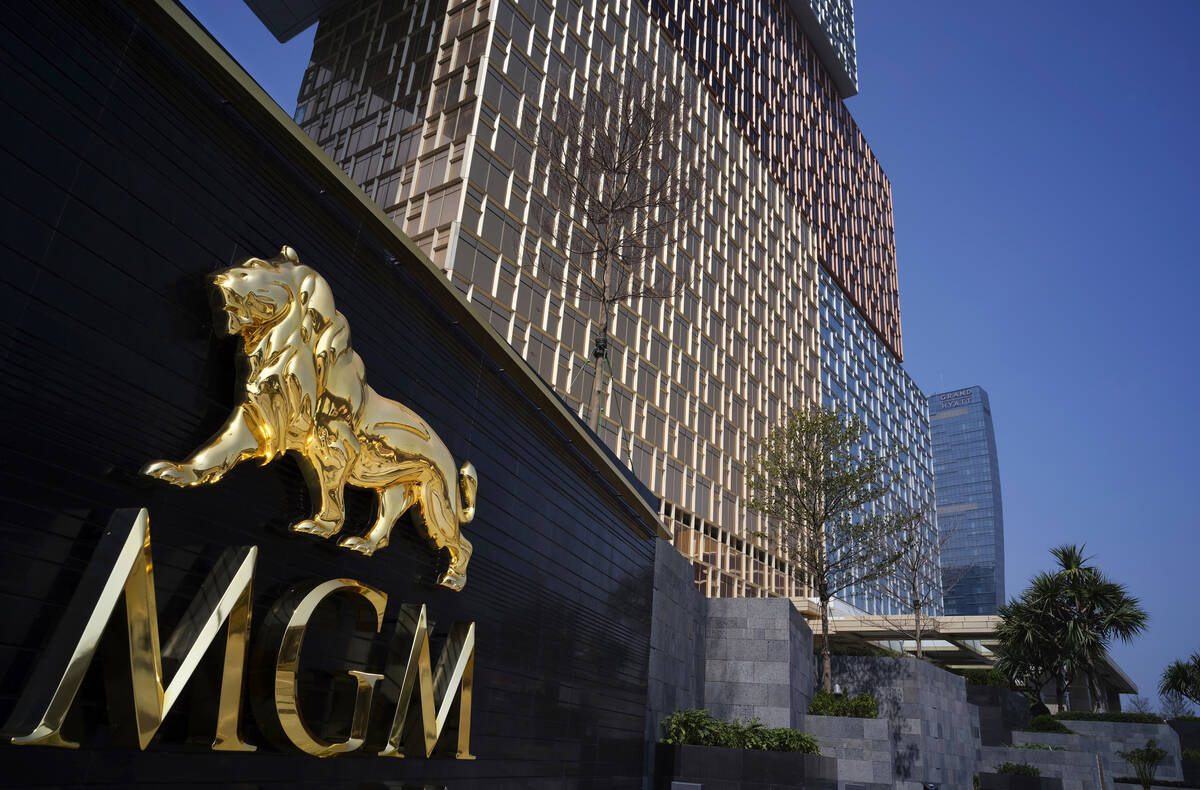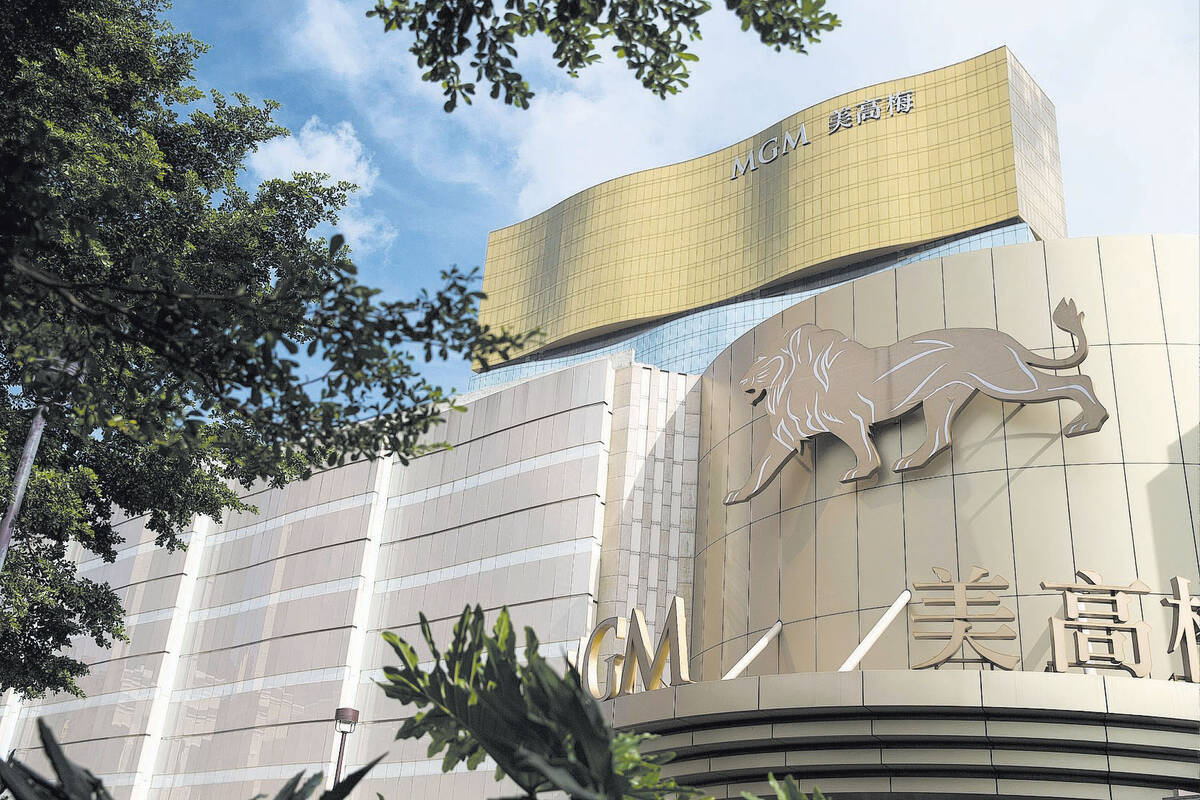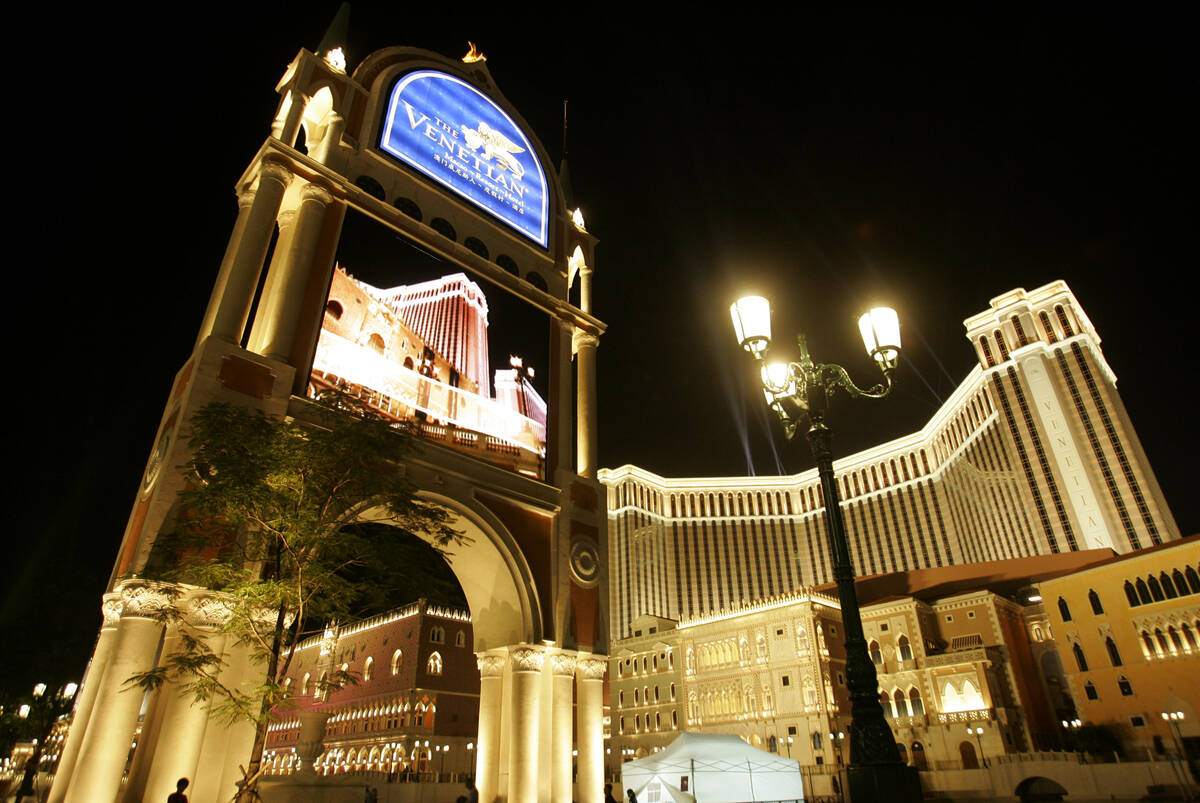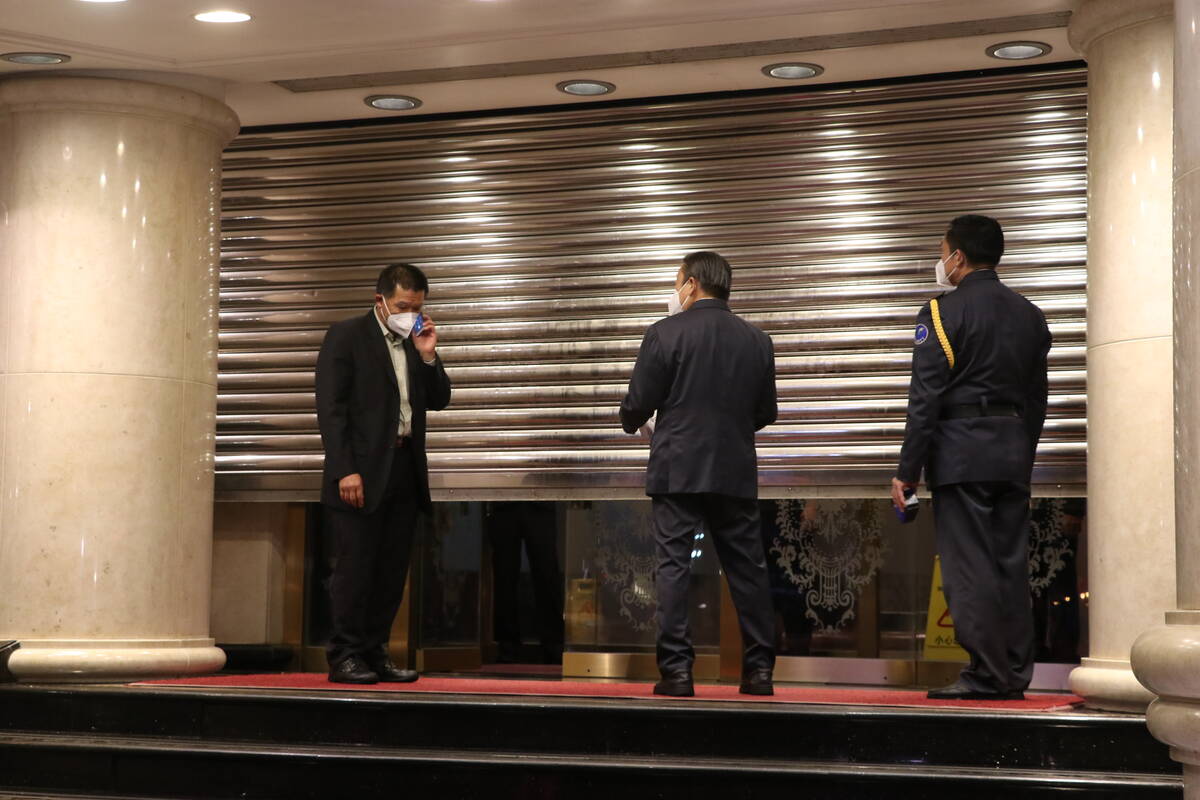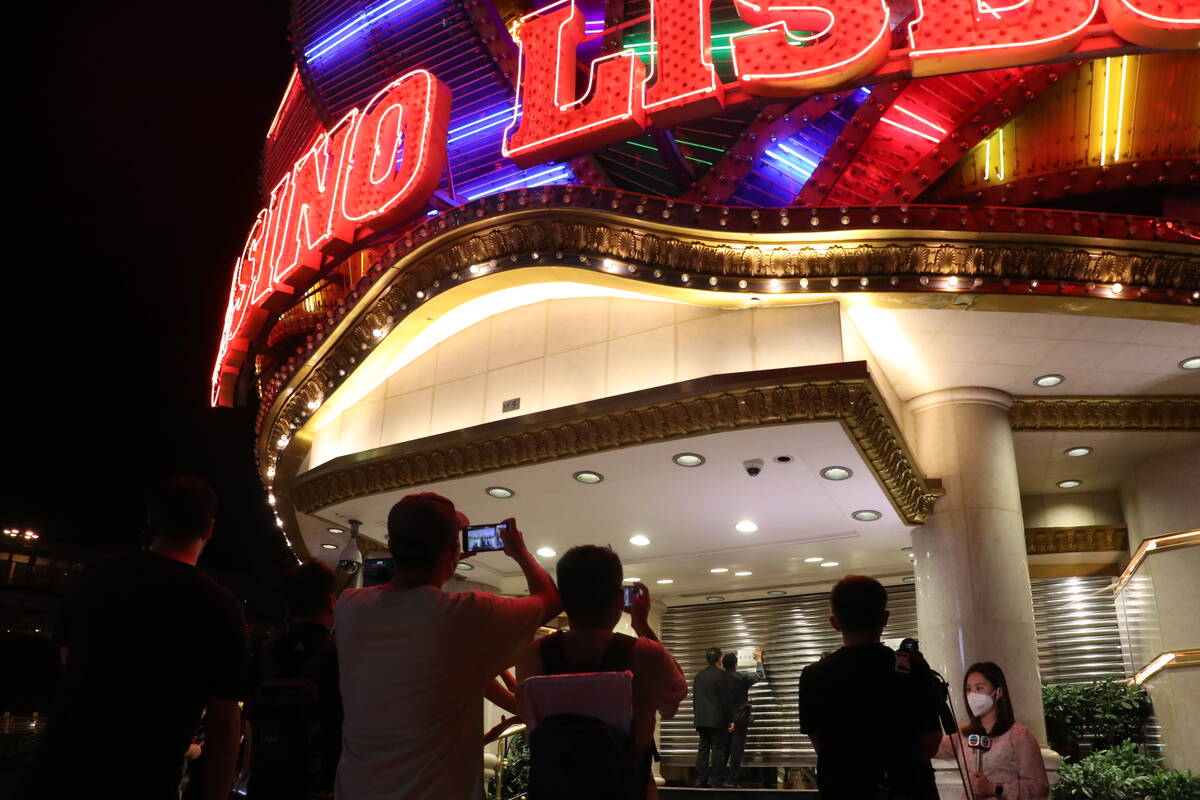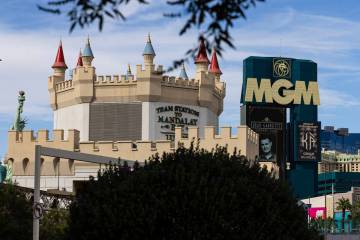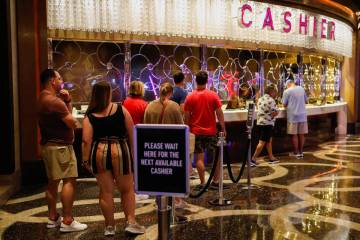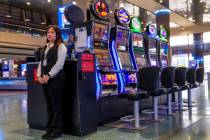Casino shutdown affecting three local companies begins in Macao
Macao casino resorts closed their doors Monday as a weeklong government-ordered shutdown began in the region, taking a toll on properties including several operated by three Las Vegas-based companies.
Because of elevated COVID-19 case numbers, Macao Secretary for Administration and Justice Andrew Cheong Weng Chun on Saturday ordered a closure of all nonessential businesses, including casinos, beginning at midnight on Monday (9 a.m., Sunday PDT) that will last through July 18.
The shutdown affects three Las Vegas-based casino companies – Macao market leader Las Vegas Sands Corp., with five properties; Wynn, which has three resorts; and MGM Resorts International, which partners on two properties in the Chinese enclave, the only place in the country where gambling is legal.
A spokesman for Wynn Resorts emailed a statement from the company on Sunday: “We will follow the government’s direction in their efforts to contain COVID-19 in Macao.” The spokesman indicated it’s unlikely the company would have any further response.
Representatives of MGM Resorts International on Sunday said they had no comment on the matter. A Las Vegas Sands spokesman on Saturday said the company would not address the current closure until its second-quarter earnings call, currently scheduled later this month.
None of the companies indicated whether resort employees would continue to be paid during the closure.
In early trading on the Hong Kong Stock Exchange Monday, the three affiliated Las Vegas companies were down.
Sands China Ltd., affiliated with Las Vegas Sands, was down $1.24, 6.6 percent from the opening bell to $17.42 a share. Wynn Macau Ltd., affiliated with Wynn Resorts Ltd., was down $0.30, 5.7 percent, to $4.94 a share. MGM China Holdings Ltd., affiliated with MGM Resorts International, was off $0.24, 5.6 percent, to $4.05 a share.
A major credit monitoring company on Friday downgraded Wynn Resorts Ltd., and a gaming analyst said in a Thursday report that Las Vegas Sands’ Singapore operation is reducing some of the damage brought on by Macao’s downturn.
According to Asian media reports, Macao residents have been ordered to stay home in quarantine for the week with only a small number of essential workers providing food markets, water, electricity, natural gas and fuels, telecommunications, public transport and garbage collection services allowed to work.
Macao, once the most successful gaming market in the world, already has been battered by restrictive travel policies, low visitation, border closures and gross gaming revenue declines resulting from strict Chinese health and safety policies over the past two years as a result of the pandemic.
More than 1,000 new cases
As of Saturday, the government reported Macao had 1,374 positive cases of COVID-19 since June 18. There were an estimated 658,000 people living in Macao in 2021.
The most recent shutdown was punctuated by a report that the Grand Lisboa resort in Macao, operated by Hong Kong-based SJM Holdings and founded by late casino mogul Stanley Ho, was locked down because of a cluster of positive COVID cases. Asian media reported around 500 people are in quarantine at the resort.
Macao was the first major casino market to shut down operations when the government ordered a 15-day closure in February 2020. A month later, Nevada casinos were ordered closed for 78 days.
While Las Vegas gaming numbers have vastly improved since casinos reopened, Macao’s haven’t.
Revenue numbers down
Macao, after years of gaming revenue successes that at its peak hit $45 billion in 2013, has seen dramatic revenue declines over the past 2½ years.
According to Macao’s Gaming Inspection and Coordination Bureau, gaming revenues produced in 2020 and 2021 were the lowest single-year back-to-back totals since 2006 and 2007.
The special administrative region’s 41 casinos won $10.8 billion (U.S.) in gaming revenue in 2021, an increase of 43.7 percent over the $7.56 billion collected in 2020. But the total was still more than 70 percent below pre-pandemic 2019, when casinos in the region produced $36.6 billion.
In the first six months of 2022, gaming revenue is at $3.3 billion. July numbers are expected to be reported in early August.
The decline in revenue in Macao has resulted in some gaming analysts downgrading the stocks of American companies operating in Macao.
Joseph Greff of New York-based J.P. Morgan said in a report to investors last week that he doesn’t expect any meaningful recovery in Macao until next year. He added that results at Las Vegas Sands’ Singapore property, Marina Bay Sands, have mitigated some of the financial damage to the company.
Local properties sold
Sands sold its Las Vegas assets, The Venetian, Palazzo and The Venetian Expo, completing the $6.4 billion transaction with Apollo Global Management Inc., earlier this year. The company has said it intends to focus efforts on Macao and Singapore and attempt to develop new domestic markets in Florida, Texas and New York.
“At current levels, Singapore operations account for 50 percent of LVS’ current market cap,” Greff said in his report to investors, published before the shutdown in Macao was announced.
“Our sense is that when we point this out to investors, they are surprised it is that high and the general perception is that Macao is the majority of the current equity value, and it was in the past when Macao was in its strong performing periods, pre-pandemic,” he said.
But Greff said Macao is a different story.
“On Macao, we believe that buy-side expectations are washed out, and have been for a while now, and that expectations are for continued soft trends in visitation from China into Macao through the end of the year to the extent that investors are paying attention and/or even care about Macao,” he said. “We don’t think there is a strong view for any gross gaming revenue comeback for Macao until next year at the earliest since it’s been near impossible to predict easing of mainland China’s zero COVID-19 tolerance policy.”
Wynn downgraded
Meanwhile, S&P Global Ratings, an American credit rating agency, reduced Wynn Resorts Ltd.’s credit rating as a result of declines in gaming revenue in Macao.
“Wynn relies heavily on a recovery in Macao because the region accounted for approximately two-thirds of the company’s property-level cash flow pro forma for a full-year contribution of Encore Boston Harbor and using 2019 cash flow for Wynn Macau,” the company said in a release. “A slower recovery in Macao’s mass gross gaming revenue will result in greater cash burn and higher leverage at the end of 2022, placing greater importance on an uncertain recovery in 2023 and increasing the likelihood that leverage may not improve below our downgrade threshold before 2024.”
S&P based the downgrade on China’s response to outbreaks of the COVID-19 omicron variant in major cities and in Macao and its strict control measures has led to increased travel restrictions, limited visitation and more depressed levels of gaming revenue than it previously forecast.
“As a result, we are lowering our Macao GGR forecast for 2022 and 2023,” the company said.
“China’s zero-COVID policy will prolong Macao’s recovery and that the predictability of the market’s recovery timeline is less certain amid the current COVID situation and macroeconomic headwinds,” the company said.
“In particular, the atypically wide range for the revised forecast in mass gross gaming revenue recovery in 2023 reflects significant uncertainty concerning the duration of China’s zero-tolerance policy regarding COVID-19. Macao’s monthly GGR in June 2022 fell to the lowest level since September 2020, amid the worst COVID-19 outbreak in Macao, in terms of number of reported cases, since the beginning of the pandemic. However, authorities in mainland China also recently shortened the length of time inbound travelers must quarantine, which may be a step toward further loosening of COVID controls in coming quarters.”
Stock shares down
Shares of Las Vegas Sands, traded on the New York Stock Exchange on Friday, closed down 95 cents, 2.7 percent, to $34.38 a share on average volume.
Wynn Resorts shares, traded on the Nasdaq exchange, were down $1.40, 2.4 percent, to $56.46 a share on average volume. The company expects to report second-quarter earnings in early August.
MGM shares, traded on the New York Stock Exchange, were down 41 cents, 1.4 percent, to $29.34 a share on volume about half the daily average. The company has scheduled its second-quarter earnings call for Aug. 3.
The Review-Journal is owned by the Adelson family, including Dr. Miriam Adelson, majority shareholder of Las Vegas Sands Corp., and Las Vegas Sands President and COO Patrick Dumont.
Contact Richard N. Velotta at rvelotta@reviewjournal.com or 702-477-3893. Follow @RickVelotta on Twitter.



